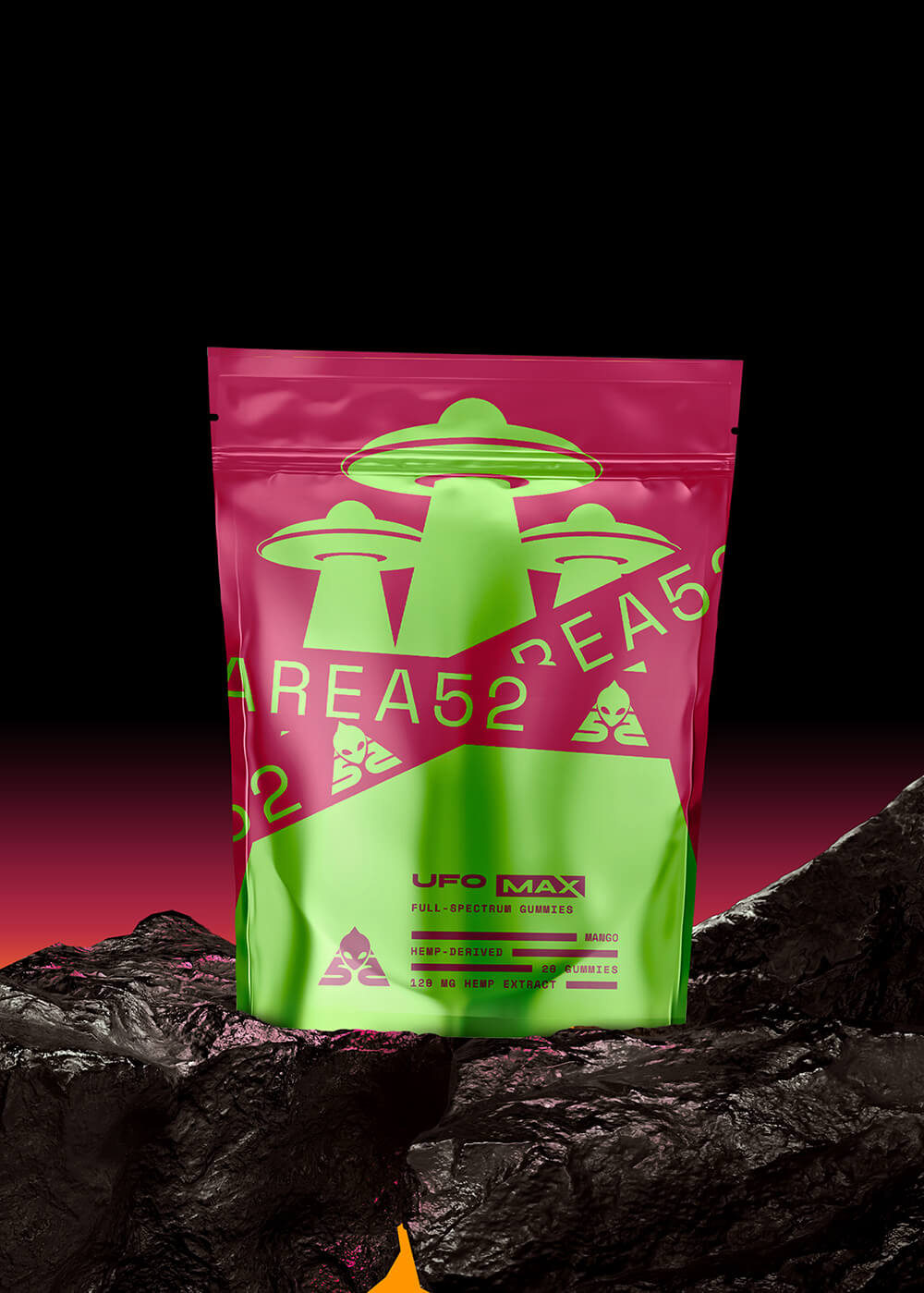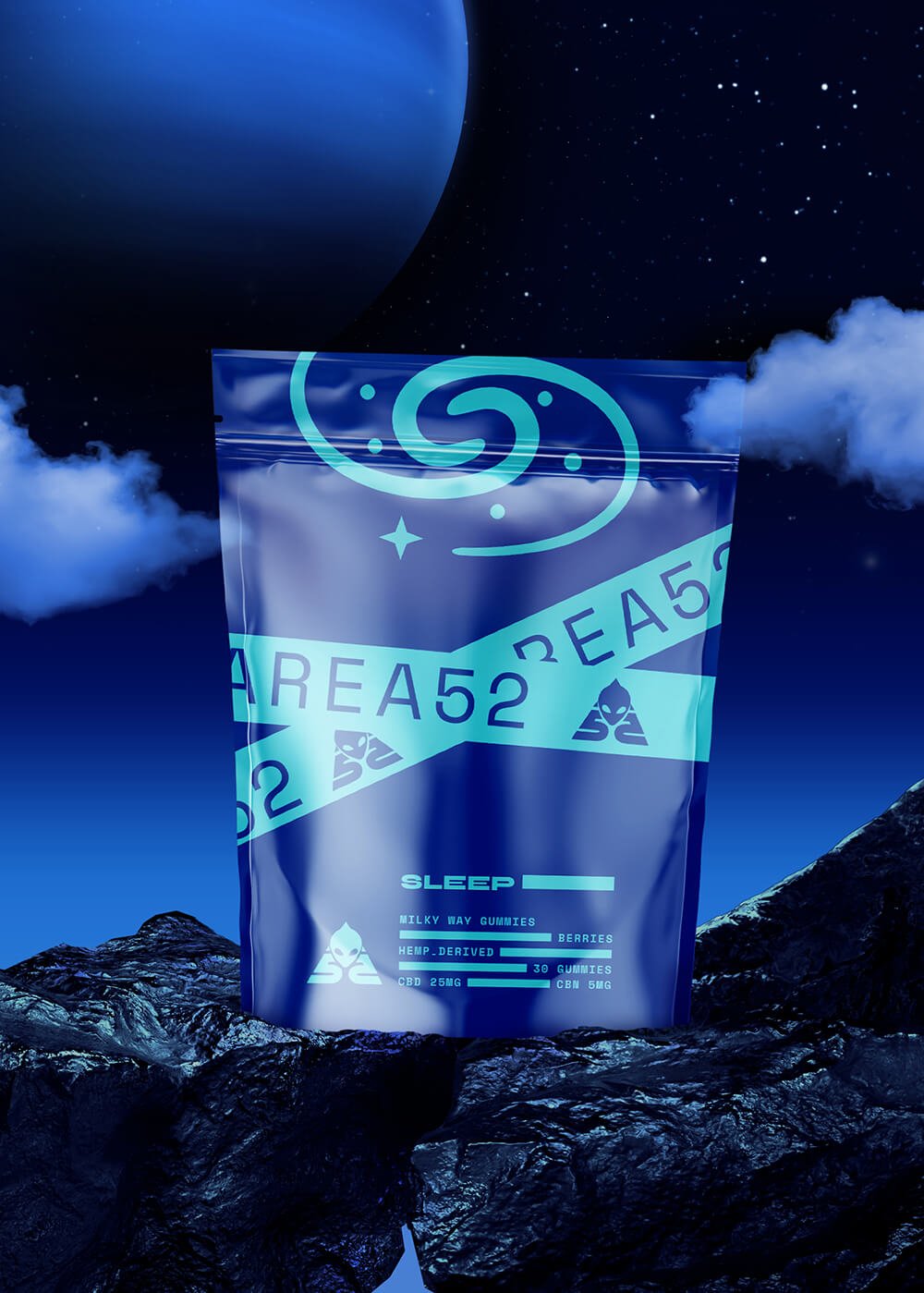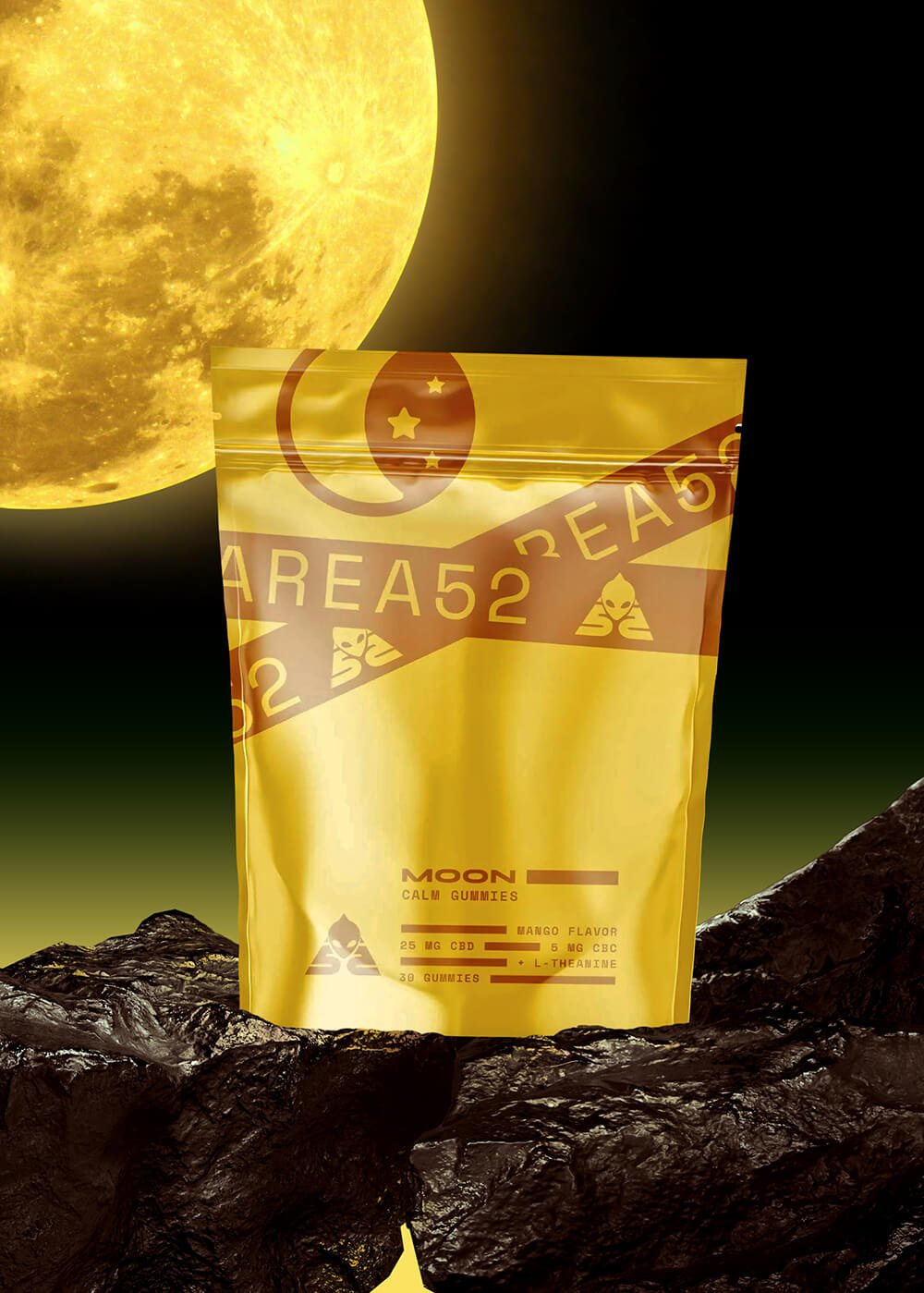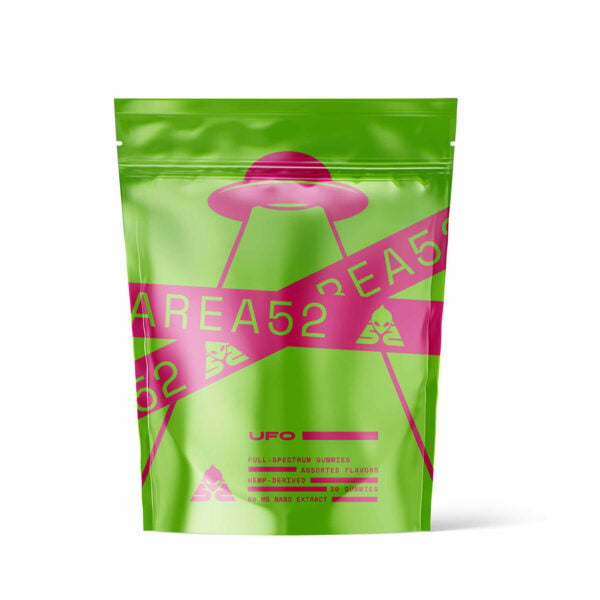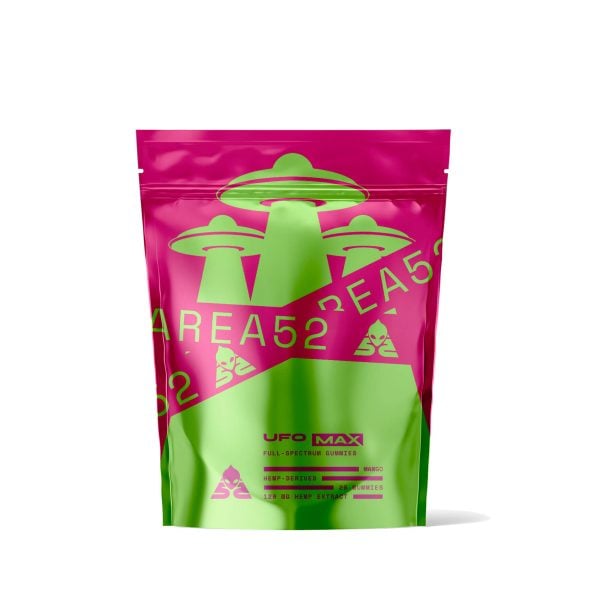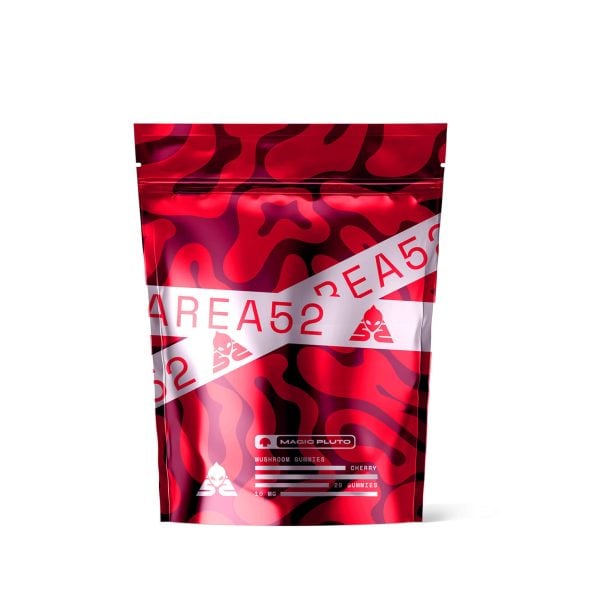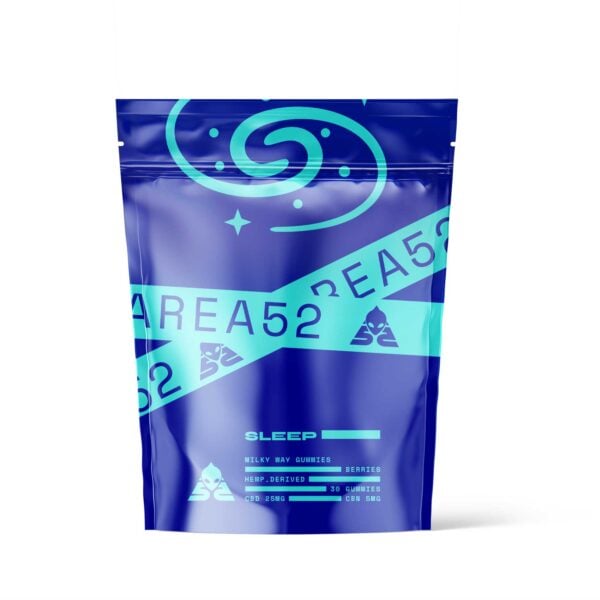What Is Delta 9 THC (Tetrahydrocannabinol)?
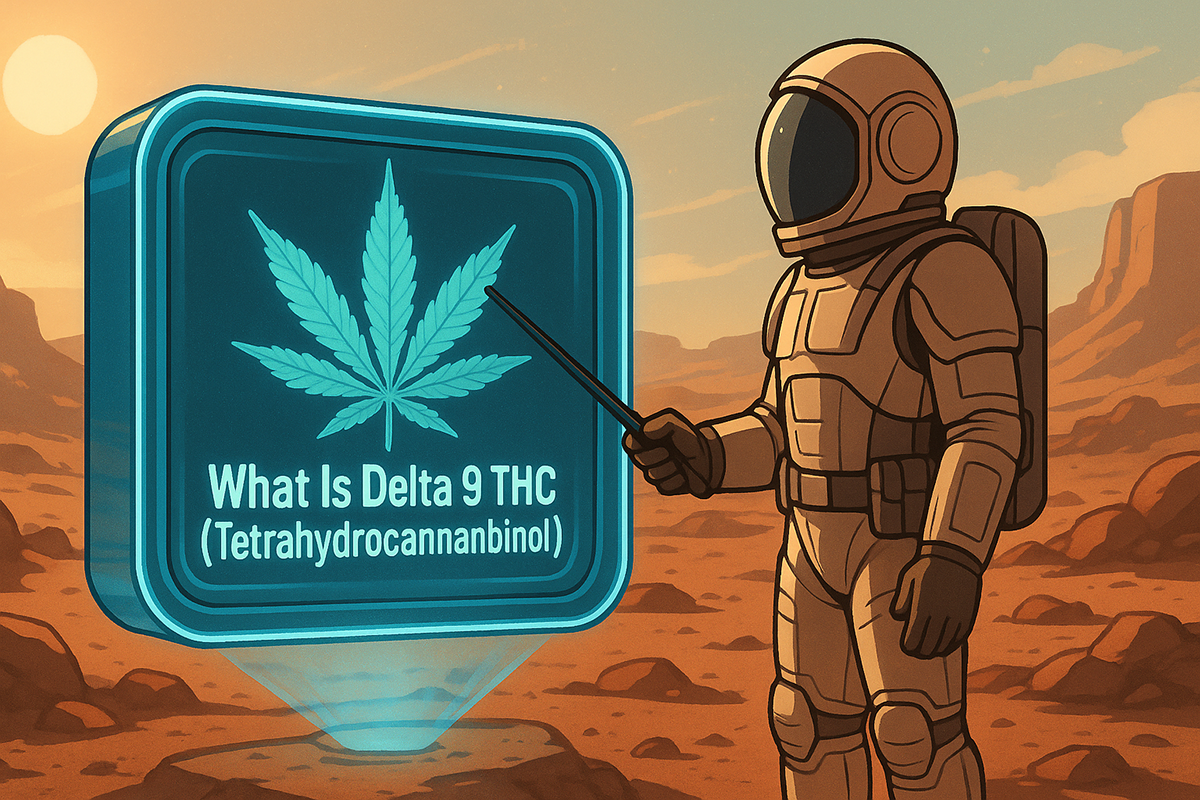
Most people know that tetrahydrocannabinol (THC) is the active ingredient in marijuana that gives it psychoactive properties, but not everyone realizes that THC appears in several different forms.
But first, let’s address a common question — what is THC? In simplest terms, THC is the cannabinoid in marijuana most responsible for producing a “high.”
Delta 9 THC is the most common form of THC found in the cannabis plant, so it has the honor of being called simply “THC.”
This article is a comprehensive guide to delta 9 THC, covering everything from its chemical structure and potential benefits to side effects and legality.
Below you’ll also find dosing recommendations, legal information, and a comparison between THC and other common cannabinoids.
What is Delta 9 THC?
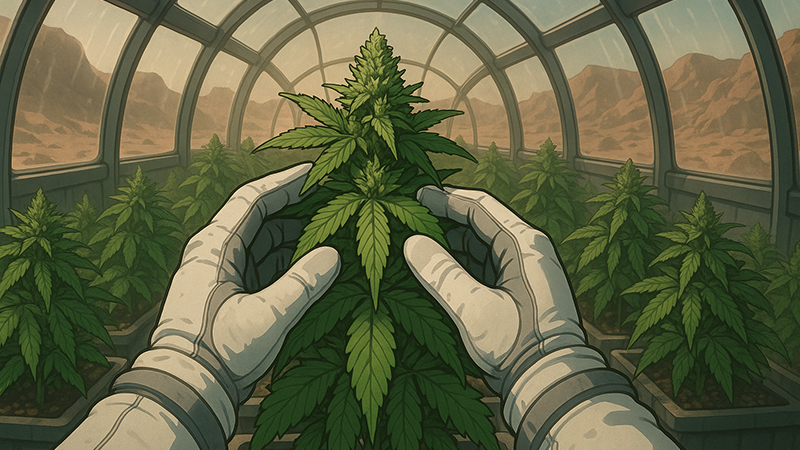
Delta 9 THC is the primary psychoactive compound in cannabis plants. Its role in the plant is to protect it from the sun’s harsh rays as well as insect invasion. Modern cannabis plants contain high levels of THC purely because of human intervention.
Raphael Mechoulam first studied THC in 1964. He was the first scientist to extract THC from cannabis and discovered that the molecule could cross the blood-brain barrier. He was also the first to realize that THC was responsible for the psychoactive effects of smoking marijuana, opening the door for further study of the body’s interaction with cannabinoids.
People usually refer to delta 9 THC as just THC, dropping the delta 9 specifier. Other forms of THC, like delta 8 THC and delta 10 THC, always are discussed using their full name to avoid confusion.
Chemically, delta 9 THC gets its name from the location of a carbon double-bond. Isomers of delta 9 THC, like delta 8 and delta 10 THC, have this double bond in a different locations (the eighth and tenth positions, respectively).
Is Delta 9 THC Natural?
Delta 9 THC is 100% natural. It’s an organic compound found in wild Cannabis sativa plants without any need for human intervention.
Some confusion surrounding THC’s natural status stems from the process used to make delta 9 THC products. Manufacturers extract THC and cannabis-derived compounds to make a concentrated extract with much higher levels of THC than you would find in nature.
There are also methods used to synthesize THC, but this is less common because of how easy it is to extract it naturally.
How Is Delta 9 THC Made?
Delta 9 THC is produced naturally in cannabis plants. Several cannabinoids, including delta 9 THC, start as cannabigerolic acid (CBGA). CBGA gets converted to tetrahydrocannabinolic acid (THCA), which, in turn, undergoes decarboxylation to form THC as the plant ages.
Because this process takes time, young cannabis plants have lower concentrations of THC than older ones.
Manufacturers extract delta 9 THC from cannabis plants to create a pure, concentrated form for use in products. One of the most effective and accessible THC extraction methods is called supercritical CO2 extraction.
This technique combines cannabis plant matter with CO2 that’s been placed under very high pressure and low temperature. This causes CO2 to change into a halfway state where it’s both a liquid and a gas at the same time. This phase is referred to as “supercritical.”
Supercritical CO2 has the same properties as chemical solvents but is much safer. Instead of having to remove the solvent after the extraction, the pressure is released, and it simply turns back into a gas.
Another way to make delta 9 THC is to convert it from cannabidiol (CBD) through a process called isomerization.
The process involves dissolving CBD in a strong acid solution. This method is popular because it is cheap but requires chemistry expertise to avoid accidentally contaminating the final product. There’s a lot of room for error with this method.
Is Delta 9 THC Legal?
Delta 9 THC is a federally restricted substance in the United States. It’s considered a Schedule I drug in the US — which is the same category as cocaine, heroin, and LSD. The Drug Enforcement Administration (DEA) views any THC-heavy substance under the same classification, although many states have ongoing research and evolving policies on medical marijuana use.
Cannabis products are only legal in states with overriding cannabis laws or in products made from non-psychoactive hemp. Hemp is defined as any cannabis plant that produces less than 0.3% THC by dried weight.
Some companies get around this concentration requirement by making extremely large hemp-derived delta 9 THC products like gummies. These technically have low concentrations of THC despite containing enough to make a psychoactive dose.
It’s unlikely these products will remain legal for much longer.
THC is primarily regulated on the state level. Despite being illegal on the federal level, most states allow either medical cannabis or the recreational use of THC products. Only a handful of states continue to ban this compound completely.
Where is Delta 9 THC Illegal?
THC is illegal, even for medical use, in the following states:
- Georgia
- Idaho
- Indiana
- Iowa
- Kansas
- Kentucky
- Mississippi
- Nebraska
- North Carolina
- South Carolina
- Tennessee
- Texas
- Wisconsin
- Wyoming
Where is THC Legal?
Many states have recently legalized delta 9 THC for recreational use, but there are still more states where THC is illegal or legal only for medical use.
Here’s a list of states where delta 9 THC is legal for recreational use:
- Arizona
- California
- Colorado
- Connecticut
- Illinois
- Maine
- Massachusetts
- Michigan
- Montana
- Nevada
- New Jersey
- New Mexico
- New York
- Oregon
- Vermont
- Virginia
- Washington
What Are the Effects of Delta 9 THC?
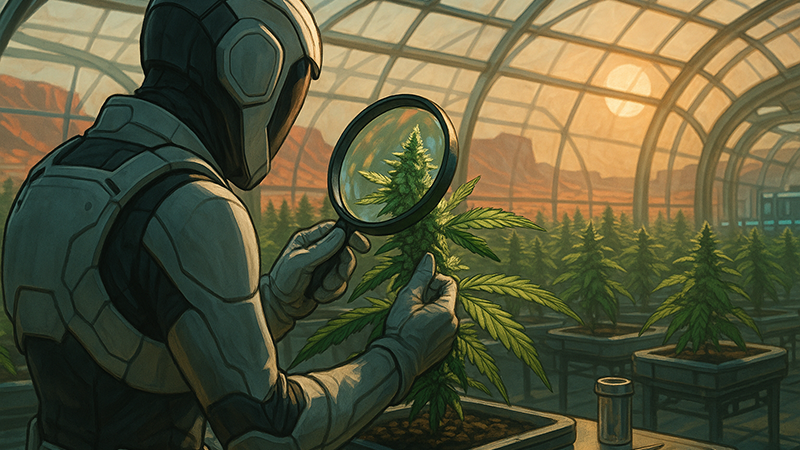
THC affects both the mind and the body. It’s hard to define specific effects because THC affects everyone a little bit differently.
To make things even more complicated, the type of THC products you’re using, the strain of marijuana, or other cannabinoids in the formula can all dramatically affect the experience.
Here are some of the most common experiences reported by delta 9 THC users:
1. Cognitive Effects of THC
Delta 9 THC is a psychoactive substance, meaning it affects the brain and cognition. Many users repoert altered sensory perception, including more vivid imagery and colors. This is not the same as a hallucination; instead, it is a more intense experience of the same sensory inputs.
Laughter and giddiness are also typical when taking THC, and some people will experience an altered perception of the passage of time. It’s common for hours to feel like minutes when taking THC.
2. Physical Effects of THC
THC also has a suite of physical effects in addition to its psychoactive effects. Perhaps most famously, THC leads to an effect colloquially called “the munchies.”
Other common physical effects include a general relaxed feeling.
What Are the Side Effects of Delta 9 THC?
Delta 9 THC has relatively few side effects, and most people who take it don’t experience any unintended negative effects.
However, some people have reported feeling anxious, paranoid, and panicky when taking THC. This is more common among people who take large amounts of THC (more info on dose size later).
Additionally, nausea and vomiting can sometimes occur with excessive doses, though it’s relatively rare compared to other side effects.
Do know too that frequent and heavy THC use could trigger or aggravate some psychiatric disorders in vulnerable individuals. There’s also the high risk of substance abuse since THC is highly addictive.
How Does Delta 9 THC Work?
The human body has an entire system built to interact with cannabinoids like THC — or perhaps THC is built to work with this system instead. This system is called the endocannabinoid system (ECS for short).
The ECS is extremely important and has a vague set of responsibilities in the body. It’s involved with a process called “homeostasis,” — which is a fancy word for balance.
The ECS has two main receptor types, blandly called cannabinoid receptor type 1 (CB1) and cannabinoid receptor type 2 (CB2).
CB1 receptors are primarily located in the body’s nervous system and are responsible for psychoactive reactions to certain cannabinoids, like THC.
Delta 9 THC interacts strongly with CB1 receptors, which in turn signal the body’s serotonin system.
Serotonin is a hormone that plays a role in our mood and feelings of well-being and also plays an important role in digestion. THC indirectly influences the effects of serotonin through the CB1 receptors — creating the characteristic “high” many THC or marijuana users seek.
Will Delta 9 THC Get You High?
Absolutely. Delta 9 THC is the primary psychoactive agent in marijuana and gives marijuana users a euphoric feeling. This compound is undeniably psychoactive.
Interestingly, THCA — which is the raw form of THC prior to degradation or heating, is non-psychoactive. This is why if you eat raw marijuana flowers, you’re not going to get high — but if you smoke them, the THCA converts to THC, which becomes psychoactive.
What Is A Normal Dose of Delta 9 THC?
A regular dose of delta 9 THC is about 10–25 mg for most users, but dose sizes can vary across a wide range depending on an individual’s experience.
Beginners should take small doses around 5 mg, while experienced THC users may take as much as 50 mg in a single dose.
Metabolic factors also influence dose size and can cause two people to react differently to the same dose. This is why beginners should start by taking small amounts of THC and increasing the dose size slowly until they find the right amount.
What If You Take Too Much Delta 9 THC?
The good news is that it’s impossible to overdose on THC. However, studies do show that the median lethal dose of delta 9 THC through oral administration usually ranges between 800 and 9000 mg/kg in various animals. In humans, our lethal dose ranges from around 4 g to 15 g [1]. It’s a huge amount of THC for one person to consume in one sitting over a very short period of time.
This doesn’t mean that taking more is better, either.
Most people stick to the 5 mg to 50 mg range; taking more can cause unwanted side effects like paranoia and anxiousness. Some people may experience hallucinations, delusions, and psychosis in extreme cases, although these are rare.
How Do You Consume Delta 9 THC?
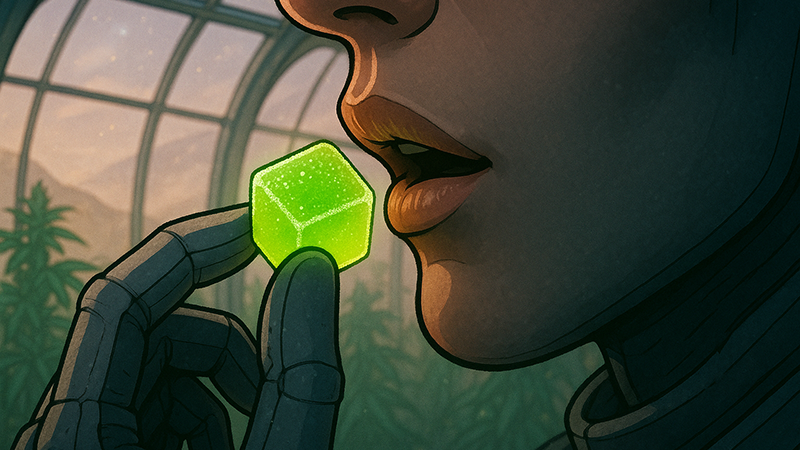
We’ll very briefly touch on all of the methods of consumption: smoking (bong, pipe, bowl, blunt, joint, hookah), vaping (vape pen, vaporizer), consuming (tinctures, oils, edibles), and topicals (cream).
Smoking Delta 9 THC
The most well-known method is smoking it in a bong, pipe, or joint. Smoking delta 9 THC products in this way come with potential side effects from inhaling smoke, but that’s beyond the scope of this article.
You can smoke THC-rich marijuana flowers, THC concentrates, rosins, live resin extracts, shatters, waxes, pastes, and more. The options are seemingly endless.
Vaping Delta 9 THC
Vaping has become more popular recently as an alternative to smoking. Proponents of vaping claim it avoids some of the negative effects of traditional smoking, although more study is needed.
Many people use vape pens or vaporizers with replaceable delta 9 THC cartridges to consume THC.
Eating Delta 9 THC
THC products like tinctures, oils, and edibles are consumed orally (in other words, you eat them). Most people recommend these products for experienced users since it’s easy to accidentally take more than intended.
Topical Application of Delta 9 THC
Few people realize that you can purchase delta 9 THC creams to apply to your skin. Topical use is more common with CBD but is equally viable for delta 9 THC.
How Does Delta 9 THC Compare To Other Cannabinoids?
Delta 9 THC is one of more than 100 cannabinoid compounds in cannabis plants. Here’s how it compares to other common cannabinoids.
Delta 9 THC vs. Delta 8 THC
Delta 8 and delta 9 THC have identical chemical formulas and only differ by the location of a carbon double-bond. This small chemical difference manifests as a large difference in potency, making delta 8 THC about 50–60% weaker than delta 9 THC. Qualitatively, delta 8 THC has similar psychoactive and physical effects to delta 9.
Delta 9 THC vs. Delta 10 THC
Delta 10 THC is an isomer of THC that only occurs naturally in minuscule amounts.
It’s unstudied mainly due to its tiny concentrations, but it seems like delta 10 THC is significantly less psychoactive than delta 9 THC.
When comparing delta 10 THC to delta 9 THC, the main difference is that delta 10 is about 50% as strong in terms of the psychoactive effects but has a greater energizing or stimulating action. It’s most popular among college students and business professionals who like to use THC products that help them focus rather than hinder it.
Delta 9 THC vs. THC-O
THC-O or THC-O acetate is a hemp-derived compound that (may) have a more forgiving legal status than delta 9 THC — it’s not clear at the moment.
Some experts suggest THC-O is federally legal in the United States, while others believe it’s illegal under the Federal Analog Act.
Delta 9 THC is still undeniably illegal on a federal level and legal in only a handful of states.
THC-O is psychoactive like delta 9 THC. In fact, it’s virtually the same compound.
THC-O is a modified version of THC that’s able to cross the blood-brain barrier more efficiently. Once across, it’s converted to delta 9 THC, where it exerts its psychoactive effects.
Because of this enhanced absorption, THC-O is estimated to be 2–3 times stronger than regular THC.
THC-O takes longer to activate in the body, usually between 20 to 30 minutes. Most THC-O products that are currently available are vape carts and tinctures.
Delta 9 THC vs. HHC
Hexahydrocannabinol (HHC) is a hydrogenated form of THC with a longer shelf-life. It has similar psychoactive properties to delta 9 THC and falls somewhere between delta 8 THC and delta 9 THC in terms of strength.
It isn’t well-studied, but early indications suggest it can be used for many of the same purposes as THC due to its chemical similarities.
Delta 9 THC vs. THCP
THCP is a phytocannabinoid bearing many similarities to ordinary delta 9 THC. The primary molecular difference between the two is the length of a carbon side chain.
Delta 9 THC has a five-carbon side chain, while THCP has a seven-carbon chain. This small-sounding difference gives THCP 30 times more binding affinity for CB1 receptors, though higher binding affinity does not make THCP commensurately more potent than THC.
This cannabinoid is thought to feel closer to 3 or 4 times as strong as conventional THC — so be very careful when using this stuff for the first time.
Delta 9 THC vs. CBD
CBD has emerged in recent years as a popular means of gleaning some of the benefits of cannabinoids without the psychoactive baggage THC carries. People who wish to use cannabis but don’t want to feel high gravitate to CBD.
More specifically, CBD doesn’t interact with CB1 receptors the way THC does. THC’s psychoactive effects come from its strong affinity for CB1 receptors. Since CBD doesn’t bind with CB1 receptors, it doesn’t produce a high.
Delta 9 THC vs. CBG
Cannabigerol (CBG) is the decarboxylated form of CBGA, the precursor molecule to THC discussed earlier. CBG shows some CB1 and CB2 binding affinity, meaning it could possess many of the same psychoactive effects as THC, although there’s little research on CBG use in humans.
CBG is legal in the United States if it comes from hemp and illegal from marijuana under the Controlled Substances Act.
Delta 9 THC vs. CBN
Cannabinol or called CBN is a naturally occurring cannabinoid found in small amounts in most cannabis plants. Prolonged exposure to ultraviolet radiation leads to higher concentrations of CBN in cannabis plants as THCA gets converted to CBNA and eventually CBN.
CBN bonds with both CB1 and CB2 receptors, although not as strongly as THC. This suggests that CBN may have similar effects to THC, but virtually no clinical research has been done on humans.
What is Synthetic THC? Is it Safe?
Synthetic cannabinoids, in general, are compounds created to interact with the body’s endocannabinoid system. These synthetic formulations have a wide range of effects, and some have serious side effects that can cause extreme injury or death.
Molecules that possess a similar structure to the THC molecule are dubbed classical cannabinoids, while molecules with different structures are called nonclassical cannabinoids.
Broadly speaking, classical synthetic cannabinoids are safe to use, and synthetic nonclassical cannabinoids are not.
Not all synthetic THC is dangerous. In fact, two forms of synthetic THC — Marinol and Dronabinol — are commonly used to treat nausea and vomiting; Dronabinol is FDA-approved for use as an appetite stimulant and anti-nausea treatment.
Key Takeaways: What is Delta 9 THC?
Delta 9 THC is the more specific name for what people typically call THC. It’s the primary psychoactive ingredient in marijuana.
Medical marijuana is legal in the United States in 38 states, and THC is legal for recreational use in 17 states as of 2021. The push for legalization is likely to continue, and it’s feasible that delta 9 THC will eventually be completely legal in all 50 states.
Most people consume THC by smoking it or taking it orally in an edible, but vape products and tinctures are becoming more popular. Topical creams are a popular way to use CBD, but many people don’t realize that THC creams exist and provide an alternative use mechanism.
The number one rule to having a good experience with delta 9 THC is to start slowly. Stick to 5 mg doses until you’re comfortable, and only increase the amount when you feel ready. Everyone’s biology is different, and the correct dose for you may be too much or too little for someone else.
Frequently Asked Questions
1. Is THC still considered a drug?
Yes. Under federal law, THC is classified as a Schedule I substance. Despite legalization in many states for medical purposes or recreational use, the Drug Enforcement Administration still considers any high-THC products to be federally illegal.
2. Is it OK to have THC every day?
Daily THC use varies from person to person. Some patients rely on medical marijuana or other cannabis-derived products for managing chemotherapy induced nausea and vomiting, abdominal pain, or psychiatric disorders under professional supervision. However, excessive daily use can lead to tolerance, dependence, or substance abuse issues. It’s best to consult a healthcare professional for personalized advice.
3. Can you take oxycodone with THC?
You should tread carefully when mixing opioids like oxycodone with THC. Combining substances may increase sedation or risks of adverse side effects and drug abuse. A healthcare provider can give the best guidance on safe usage and possible drug interactions.
4. Which is better for pain, CBD or THC?
It often depends on the individual and the source of the pain. THC can be more potent for certain types of discomfort due to its interaction with cannabinoid receptors tied to pain sensation. CBD, although it also helps with pain relief, tends to have anti-inflammatory properties without causing a “high.” Some people find the best relief using products that combine both cannabinoids in different ratios.
5. Is 90 percent THCA a lot?
Yes. A product with 90% THCA is extremely potent once it’s heated (since THCA converts to THC). If you’re new to taking cannabis, you’ll want to be careful with highly concentrated forms like this. Even long-time users often start with very small doses to avoid overwhelming psychoactive effects.
References:
- Ng T, Keshock MC. Tetrahydrocannabinol (THC) [Updated 2023 Nov 12]. In: StatPearls [Internet]. Treasure Island (FL): StatPearls Publishing; 2025 Jan-. Available from: https://www.ncbi.nlm.nih.gov/books/NBK563174/
